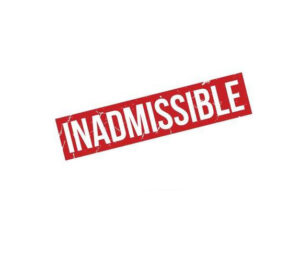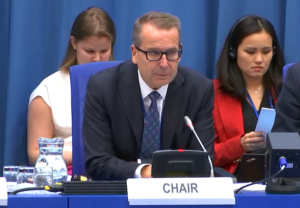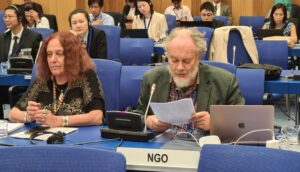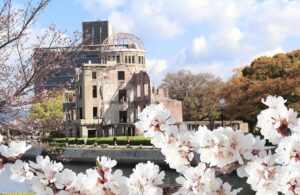On August 9, the 76th anniversary of the nuclear bombing of Nagasaki, 5 United States organizations and 21 United States nuclear weapons policy experts sent a letter to Japan Prime Minister Yoshihide Suga and leaders of the main Japanese political parties, calling on Japan not to oppose a possible move by the United States to adopt a no-first-use policy, and to affirm that such a policy would not stimulate Japan to acquire nuclear weapons (see below for the text of the letter plus list of endorsers).
Japan is part of a security relationship with the United States that provides for the threat or use of nuclear weapons by the US to defend them from potential aggressors. There are similar ‘extended nuclear deterrence’ arrangements between the US and other allies including South Korea, Australia and NATO countries.
The letter asserts that opposition by the US allies to no-first-use policies, or a similar ‘sole purpose’ policy, was a major factor blocking the adoption of such policies by President Obama during his administration. Now that the Biden Administration is considering such a policy, the endorsers of the letter say that “It would be tragic if Japan, the only country to suffer nuclear attacks, and a staunch advocate of the abolition of nuclear weapons, blocked this small but important step toward the abolition of nuclear weapons.”
Japanese position on no-first-use
During the Obama administration, Japan was one of the few of the allies that gave support to President Obama to adopt either a no-first-use or a sole purpose policy. Katsuya Okada, a member of Parliamentarians for Nuclear Non-proliferation and Disarmament who was Foreign Minister at the time, wrote a letter to his US counterpart Secretary of State Hillary Clinton in 2009 specifically supporting a US no-first-use policy (See Japanese Foreign Minister Okada Proposes ‘No First Use’ Talks with U.S.). His letter was supported by another 204 Japanese legislators (See 204 Japanese Legislators Call on President Obama to Adopt ‘Sole Purpose’ Doctrine).
However, there were indications during the Obama Administration that the Japanese Defence establishment was not as supportive of no-first-use or sole purpose as was the Foreign Minister and the majority of parliamentarians. This time around the Japanese administration appears even less supportive. ‘We understand that high officials of Japan’s government have already expressed opposition to a US non-first-use or sole-purpose declaration in April this year,’ say the letter endorsers. This is a reason why the recent letter is so important.
High-level support from USA
The endorsers of the letter include two former high-level US officials – William J. Perry, former Secretary of Defense, and Morton H. Halperin, Former Senior Official in the Departments of State and Defense and the National Security Council.
William J Perry, and a number of other former high-level US officials, also joined with over 1200 other political, military and religious leaders, legislators, academics, scientists and other representatives of civil society in endorsing a related letter supporting No-First-Use earlier this year, an Open Letter to Presidents Biden and Putin prior to their June Summit. The Open Letter to Presidents Biden and Putin arose from the NoFirstUse Global campaign and strategy meeting held in May.
Text of the Letter
A Call for Prime Minister Yoshihide Suga and other leaders of Japan’s political parties not to oppose a Biden administration declaration of a no-first-use or sole-purpose policy
To:
Mr. Yoshihide Suga. Liberal Democratic Party (Prime minister)
Mr. Natsuo Yamaguchi, Komeito (Junior partner of the coalition government)
Mr. Yukio Edano, Constitutional Democratic Party
Mr. Kazuo Shii, Japanese Communist Party
Mr. Ichiro Matsui, Nippon Ishin no Kai
Mr. Yuichiro Tamaki, Democratic Party for the People
Ms. Mizuho Fukushima, Social Democratic Party
Mr. Taro Yamamoto, Reiwa Shinsengumi
It has been reported that, as part of its Nuclear Posture Review scheduled to be completed in January 2022, the Biden administration will consider, for the purpose of reducing the risk of nuclear war, a declaration that the United States will not use nuclear weapons first and/or that the sole purpose of the U.S. nuclear arsenal is to deter and, if necessary, to retaliate against a nuclear attack on itself, its military forces abroad, or an ally.
Although the declaration would not affect security arrangements with allies, including extended nuclear deterrence against nuclear attacks on them, the concern that US allies – worried about “a weakening of the US nuclear deterrence against non-nuclear attacks”– might develop their own nuclear weapons, has been cited as a major factor that blocked adoption of a no-first-use policy by the Obama administration[1] Japan has been mentioned as one of the most likely countries to go nuclear.
We understand that high officials of Japan’s government have already expressed opposition to a US non-first-use or sole-purpose declaration in April this year.[2] It would be tragic if Japan, the only country to suffer nuclear attacks, and a staunch advocate of the abolition of nuclear weapons, blocked this small but important step toward the abolition of nuclear weapons.
We wish to remind you that as Vice-President Biden said in Jan. 2017, “Given our non-nuclear capabilities and the nature of today’s threats—it’s hard to envision a plausible scenario in which the first use of nuclear weapons by the United States would be necessary. Or make sense.” Biden wrote in March 2020 in Foreign Affairs article that: “I believe that the sole purpose of the US nuclear arsenal should be deterring—and, if necessary, retaliating against—a nuclear attack. As president, I will work to put that belief into practice, in consultation with the US military and US allies.”
We, the undersigned, call on you, as Prime Minster and other leaders of Japan’s political parties, to declare that you will not oppose a Biden administration declaration of a no-first-use or sole-purpose policy and affirm that such a policy would not increase the likelihood of Japan acquiring its own nuclear weapons.
Endorsers:
Organizations
Federation of American Scientists
signed by Hans Kristensen, Director, Nuclear Information Project,
Greater Boston Physicians for Social Responsibility
Signed by Anna Linakis Baker, MPH, Executive Director
Peace Action
signed by Kevin Martin, President
Tri-Valley CAREs (Communities Against a Radioactive Environment)
signed by Marylia Kelley, Executive Director.
Union of Concerned Scientists
Signed by Stephen Young, Acting Director, Global Security Program
Individuals
Bob Alvarez, Associate Fellow of the Institute for Policy Studies
Tom Collina, Director of Policy, Ploughshares Fund
Steve Fetter, Professor, University of Maryland
Lisbeth Gronlund, Ph.D., Research Affiliate, Laboratory for Nuclear Security and Policy, Department of Nuclear Science and Engineering, MIT
Morton H. Halperin, Former Senior Official, Departments of State and Defense and National Security Council, United States Government
Steve Gallant, Coordinating Committee of “No First Use: Decrease the Danger of Nuclear War” Coalition, and Board Member of Campaign for Peace, Disarmament and Common Security
Joseph Gerson, President, Campaign for Peace, Disarmament and Common Security.
Gary R. Goldstein, Tufts University, Professor of Physics
Dr. Laura Grego, Research Director and Senior Scientist, Global Security Program, Union of Concerned Scientists
Daryl G. Kimball, Executive Director, Arms Control Association
Gregory Kulacki, Senior Analyst, Global Security Program, Union of Concerned Scientists
Peter Kuznick, Professor of History and Director, Nuclear Studies Institute, American University, Washington, DC
Jeffrey Lewis, Professor, Middlebury Institute of International Studies at Monterey
William J. Perry, Former Secretary of Defense
Guy Quinlan, President, Lawyers Committee on Nuclear Policy.
Scott Sagan, Stanford University
Elaine Scarry, Cabot Professor of Aesthetics, Harvard University. Author, Thermonuclear Monarchy: Choosing between Democracy and Doom
Frank von Hippel, Program on Science and Global Security, Princeton University.
Sharon Weiner, Associate Professor, American University.
Lawrence Wittner, Professor of History Emeritus, State University of New York/Albany
David Wright, Laboratory of Nuclear Security and Policy, Massachusetts Institute of Technology





